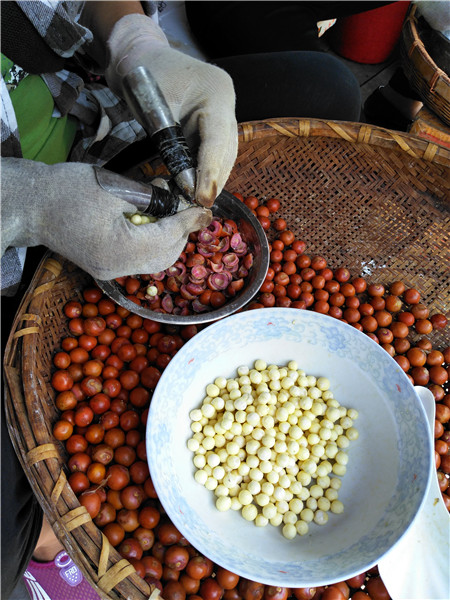China Travel & Tourism News
|
 |
Seeds of autumn
|
| 06-Dec-2016 - China Daily |

A peeler wears iron fingertip protectors that preserve her fingernails as she works. XU JUNQIAN/CHINA DAILY
By 9 o'clock every morning, 55-year-old Hu Xiuxia has been sitting on a small stool and peeling off white seeds from a pomegranate-like plant for almost three hours.
The plant in Hu's hands is called gorgon fruit or nut, or "rice from chicken head" among locals, because the fruit looks like chicken head. The aquatic plant has been grown and enjoyed in Suzhou for centuries, a land that is believed by many Chinese to be flowing with milk and honey, or paved with fish and rice in Chinese slang.
Hu works near a dim green tea shop at the entrance of the biggest and oldest wet market in Suzhou, Jiangsu province. Behind her, the muddy pink shucks are piled waist-high. But in front of her, the starchy white seeds are pearl-sized and surprisingly skimpy?just enough to blanket the bottom of a salad bowl. It takes 10 kilograms of the fruits to produce 1 kilo of seeds.
From late August to mid-October every year, when the plant's seeds become edible, hundreds of middle-aged and more elderly women gather at the entrance of local wet markets and put on a pop-up show, stripping the fruit down to the delicately flavored seeds.
Men wouldn't have the patience for the job, the women say, but an experienced woman can peel 2 to 3 kilograms of seeds every day, despite wearing iron fingertip protectors that preserve their fingernails as they work.
Suzhou is perched on Taihu Lake, China's second-largest freshwater lake, and farmers there wholesale the fruit at less than $2 per kilo. At the wet markets, the seeds sell for $35 per kilo. To rent a space at bustling locations like Fengmen Market, it costs about $10 every day. The margin in-between is the profit for Hu, a retired shop assistant.
Every autumn, seasonal gorgon-fruit peelers like Hu are so numerous that conflicts can erupt between long-term stalls and the temporary shuckers and sellers. This year, the administration office of Fengmen Market opened a basketball-court-size space for them to do business.
For Suzhou natives, gorgon seeds are like truffles for Italian or mastutake for the Japanese. The seed is classified among the "eight water treasures" together with lotus roots, water celeries and water chestnuts?considered the signature ingredients that characterize the cuisine of Suzhou, famous for being delicate and adapting to the change of seasons.
The weeks when gorgon seeds are on that market are as important as Chinese New Year on the local culinary calendar, says Ye Ting, a prominent local food critic.
The gorgon seed has no special flavor or fragrance, except a subtle sweetness. People who are fond of it say it's the special texture that they are paying for, five times more than coix (Job's tears) seeds, which have a similar texture.
The way locals savor it is simple: boiled in water, preferably water from Taihu, and sprinkled with a handful of osmanthus flowers and a spoonful of honey as a finishing touch. Restaurants often use scooped-out pumpkins or papaya as bowls, but it makes no difference to the taste of the dessert. Occasionally, gorgon seeds are stir-fried with peeled shrimps, also from Taihu Lake, as a fancy hot dish.
Fastidious Suzhou natives count the lifespan of these seeds from the shucks to the bowls, by the hour. At Hu's stall, a two-hour-old bowl of seeds can be bought 10 yuan ($1.5) cheaper than the fresh-peeled ones. Older seeds go to tourists or to markets outside Suzhou.
Increasing demand from both within Suzhou and outside is pushing up the price of the seeds.
According to Bao Zhongzhou, a senior research agronomist in Suzhou, it was not until late in the 1980s that gorgon fruit cultivation spread to lowland ponds outside Suzhou. The plant has a table-size green leaf and light purple flowers that bloom late in summer. Now the total area in which China grows the gorgon fruit is estimated to be around 67,000 square kilometers.
But veteran foodies insist that the water of Taihu Lake breeds the best gorgon seeds. |
| 06-Dec-2016 - China Daily |
Main Cities in China Travel and China Hotels







 Beijing Beijing  Canton Canton
 Shanghai Shanghai  Hong
Kong Hong
Kong  Qingdao Qingdao  Hangzhou Hangzhou |
Other Major Cities:
Changchun,
Chengdu,
Chongqing,
Dalian,
Dongguan,
Dunhuang,
Foshan,
Guangzhou,
Guilin,
Haikou,
Harbin,
Hainan,
Hangzhou,
Kunming,
Lhasa,
Macau,
Nanjing,
Qingdao,
Sanya,
Shenyang,
Suzhou
Shanghai,
Shenzhen,
Tianjin,
Weihai,
Wenzhou,
Xiamen,
Xi'an,
Yiwu
|
Major China Hotels:
Beijing Hotels,
Chengdu Hotels,
Chongqing Hotels,
Dalian Hotels,
Foshan Hotels,
GuangZhou Hotels,
Guilin Hotels,
Hangzhou Hotels,
Harbin Hotels,
HongKong Hotels,
Kunming Hotels,
Macau Hotels,
Nanjing Hotels,
Qingdao Hotels,
Sanya Hotels,
Shanghai Hotels,
Shenyang Hotels,
Suzhou Hotels,
Tianjin Hotels,
Urumqi Hotels,
Wenzhou Hotels,
Xiamen Hotels,
Xian Hotels |
|
 |
|






